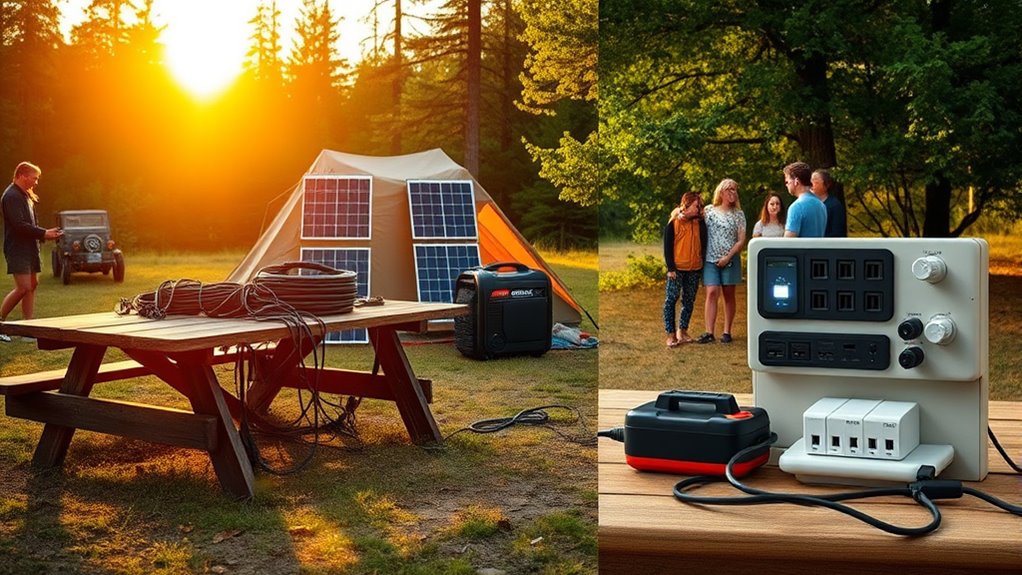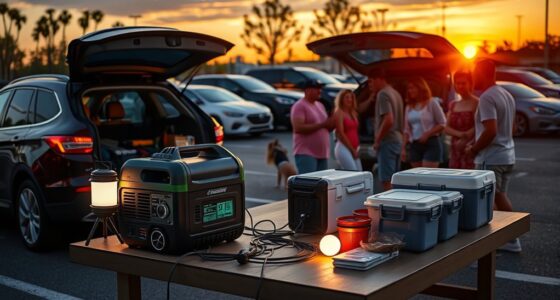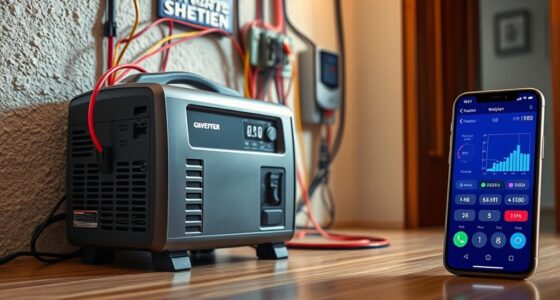Many campers overestimate their power needs, underestimate battery life, or forget how temperature affects batteries, leading to outages. Using the wrong devices or ignoring efficiency wastes energy and causes unexpected challenges. Plus, neglecting charging times, equipment weight, and backup plans can leave you unprepared. To avoid these pitfalls, understanding and planning your power setup carefully is key. Keep exploring to learn how to maximize your camping power and stay connected during your adventures.
Key Takeaways
- Many underestimate actual power needs, leading to oversized equipment and inefficiency.
- Battery capacity and solar recharge times are often overlooked, risking power shortages.
- Environmental factors like temperature significantly impact battery performance and lifespan.
- Equipment efficiency, compatibility, and portability are frequently ignored, causing system issues and inconvenience.
- Failing to plan for power failures and backups can result in disrupted camping experiences.
Overestimating Your Power Needs
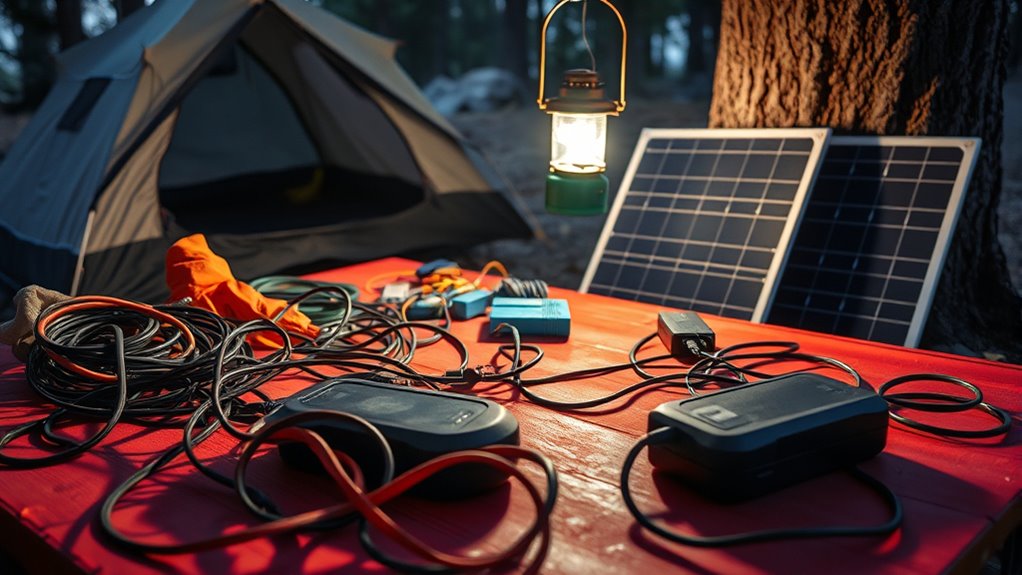
Many campers mistakenly overestimate their power needs, thinking they’ll require more energy than they actually do. This often leads to purchasing oversized generators or excessive solar panels, which can be unnecessary and costly. In reality, understanding your actual energy consumption helps you choose the right generator capacity and solar panel setup. Start by listing essential devices and estimating their daily power draw. Remember, a smaller generator with adequate capacity can power your essentials without wasting fuel or space. Similarly, installing enough solar panels to meet your daytime energy needs helps reduce reliance on backup power. Avoid the temptation to overbuy; instead, focus on accurate calculations to ensure you have enough power for your trip without overspending or carrying unnecessary weight. Knowing your energy requirements can help you make smarter, more efficient decisions for your camping setup.
Underestimating Battery Capacity and Runtime

Underestimating your battery capacity and runtime is a common mistake that can leave you powerless when you need it most. If you don’t account for your actual energy needs, your gear might shut down unexpectedly. Remember, solar panels can help recharge batteries, but only if your capacity is sufficient. Inverter efficiency also plays a role—inefficient inverters waste power, reducing runtime. Additionally, understanding your overall whole‑house water filtration system can offer insights into managing energy consumption for various appliances. Be mindful of these pitfalls: – Assuming your battery will last as long as you think without considering real usage – Overlooking how less-than-ideal sunlight reduces solar panel output – Ignoring inverter efficiency, which can drain more power than expected – Not planning for backup power sources in case of extended cloudy days Proper planning ensures your power lasts through your entire trip.
Neglecting the Impact of Temperature on Batteries

Temperature considerably affects your battery’s performance and lifespan, yet it’s often overlooked when planning for camping trips. Extreme temperatures can cause battery temperature fluctuations that reduce capacity and cause faster degradation. Cold weather, in particular, can sharply decrease your battery’s effective capacity, making it seem like your power source is failing prematurely. Conversely, high temperatures accelerate chemical reactions inside the battery, leading to thermal management issues and potential damage. To avoid these problems, you need to contemplate thermal management strategies, such as insulating your batteries or storing them in temperature-controlled environments. Monitoring battery temperature during your trip helps ensure ideal performance and longevity. Additionally, understanding state tax implications for IRA withdrawals can help you plan for potential expenses related to energy needs. By paying attention to temperature effects, you can maximize your battery’s lifespan and reliable power supply during your camping adventures.
Assuming All Devices Have the Same Power Consumption
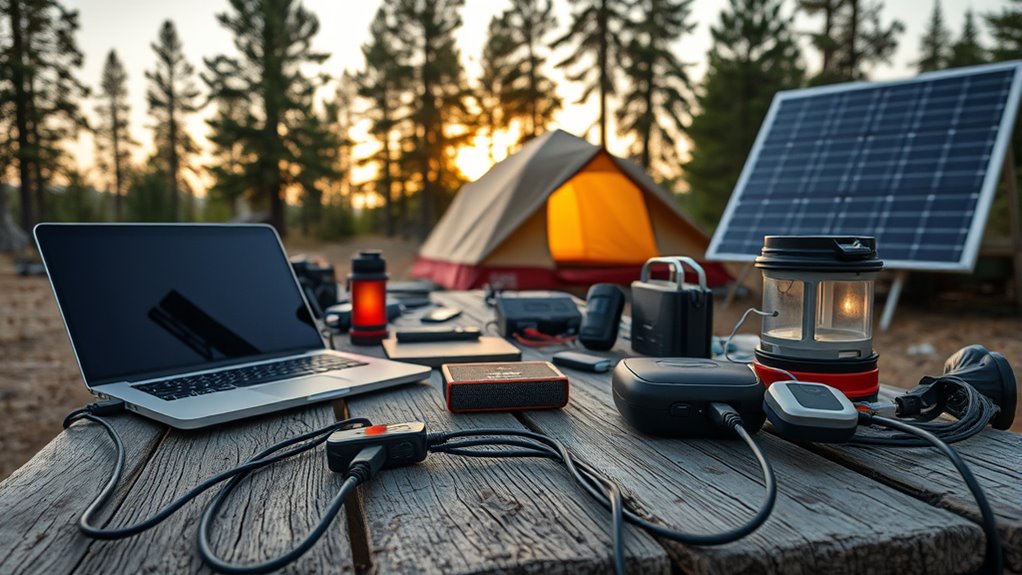
Many people assume all camping devices use the same amount of power, but that’s rarely true. Your phone charger, lantern, and portable fridge all have different energy needs, which can lead to overestimating battery life. Ignoring these differences might leave you without power when you need it most. Additionally, understanding the specific power consumption of each device can help you better plan your survival gear and ensure your essential electronics stay functional throughout your trip.
Varying Device Power Needs
While it might be tempting to assume all your camping devices draw the same amount of power, in reality, their energy needs vary widely. Some gadgets, like smartphones or LED lanterns, consume minimal power, while others, such as portable fridges or small appliances, demand much more. Ignoring these differences can lead to insufficient power supplies or wasted energy. To guarantee your setup is reliable, consider the specific power needs of each device. For example, choosing the right solar panels to match your total load is essential, and verifying inverter compatibility prevents overloads. Proper planning means you won’t be caught off guard by unexpected power demands, giving you peace of mind during your trip. Remember, understanding these differences makes all the difference in a smooth camping experience. Additionally, understanding your Volkswagen Tuning options can help you optimize your vehicle’s performance for off-road adventures or long trips.
Overestimating Battery Life
Assuming all your devices consume the same amount of power can lead to serious miscalculations in your camping power plan. In reality, gadgets like smartphones, lanterns, and portable fridges vary greatly in energy use. Overestimating battery life means you might rely too heavily on solar panels or a generator, risking power shortages. Remember, solar panels need proper positioning and consistent sunlight, and your generator requires regular maintenance to run efficiently. Ignoring these differences can cause unexpected shutdowns, leaving you without power when you need it most. To avoid this, check each device’s power consumption and plan your energy sources accordingly. Properly evaluating usage helps prevent overestimating battery capacity, ensuring your camping trip stays powered without unnecessary stress or resource waste. Additionally, regional legal resources can provide guidance on navigating emergency situations or if you need to seek assistance during your trip.
Ignoring Power Efficiency
Have you ever thought that all your camping devices use the same amount of power? Assuming so can lead to inefficient power planning. Many campers overlook the importance of solar optimization and energy conservation, risking power shortages. Not all devices drain energy equally—some consume much more than others. By ignoring this, you might overestimate your power needs or waste energy on low-priority gadgets. To stay prepared, prioritize devices based on actual consumption, and focus on energy-efficient options. Use solar panels strategically to maximize solar optimization, charging high-use devices during peak sunlight. Remember, every watt saved counts. Properly managing power efficiency ensures your energy reserve lasts longer, giving you peace of mind and more time to enjoy your adventure. Additionally, understanding the power consumption of each device helps you create a more accurate and effective energy plan.
Forgetting to Include Charging Time in Your Planning

Many campers overlook the time needed to fully charge their devices or batteries, which can lead to unexpected power shortages during your trip. Proper battery maintenance requires planning for enough charging time, especially if you’re relying on solar panel setup. Solar panels don’t deliver instant power; they need adequate sunlight and time to replenish batteries fully. Rushing to charge your devices without factoring in this time can leave you without power when you need it most. Include extra hours in your schedule for charging, especially if you’re using renewable sources like solar. This ensures your batteries are topped off and ready to go, preventing disruptions. Planning ahead for charging time helps you avoid surprises and keeps your devices powered throughout your camping adventure.
Ignoring the Efficiency of Power Conversion Devices
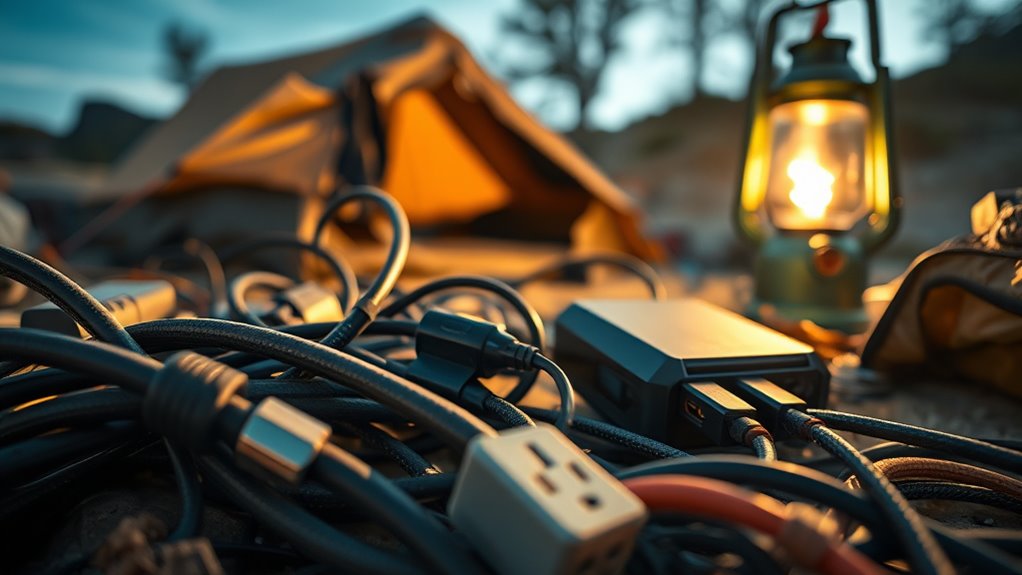
Although power conversion devices like inverters and chargers are essential for camping, people often overlook how inefficient they can be. Poor device efficiency wastes valuable energy, meaning your power source depletes faster and reduces your overall runtime. Ignoring this can lead to unexpected power shortages and frustration during your trip. Additionally, high refresh rates in projectors are crucial for smooth visuals, just as high efficiency in power devices is vital for conserving energy. You might find your batteries draining quicker than expected, forcing early breaks or compromises. Overestimating usable power can leave your essential devices uncharged when you need them most. You may spend more time recharging or replacing power sources, cutting into your adventure. Failing to account for power conversion losses results in inefficient planning, leaving you unprepared for emergencies.
Understanding the true impact of power conversion efficiency ensures your gear stays powered longer and your trip runs smoothly.
Using the Wrong Type of Power Source for Your Gear
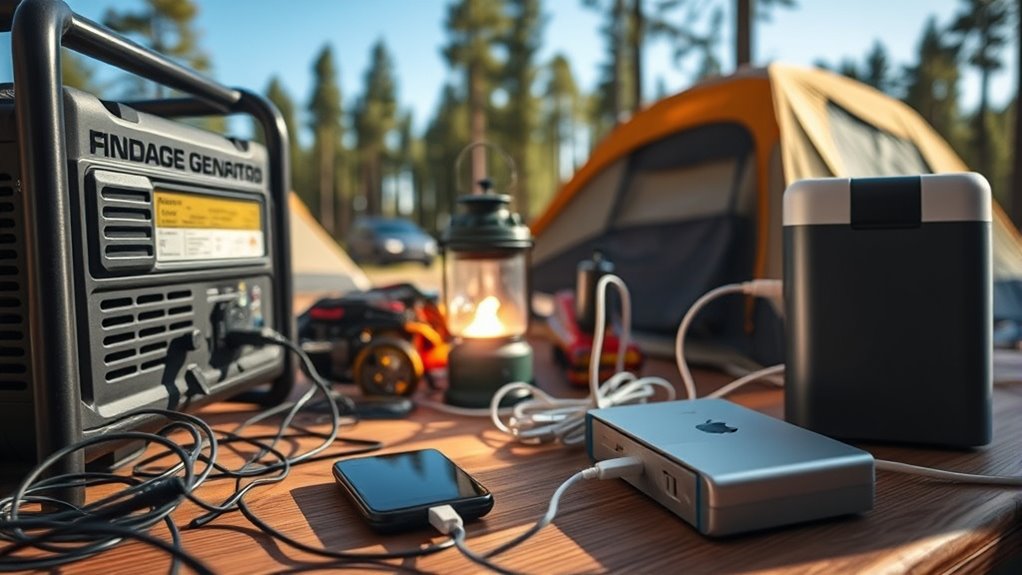
Are you using the right type of power source for your camping gear? Choosing the wrong one can lead to insufficient power or damage. If you’re relying solely on solar panels, make sure they provide enough wattage to meet your needs, especially on cloudy days. Proper generator sizing is also essential; a generator that’s too small won’t keep up with your demands, while one that’s too large wastes fuel and adds unnecessary weight. Assess your equipment’s power requirements carefully before selecting a source. For sensitive electronics, consider inverter generators or portable batteries to prevent voltage issues. Don’t overlook the importance of matching your gear’s power needs with the correct source, ensuring a smooth, reliable energy supply during your trip. Additionally, understanding power output and capacity can prevent overloading your system and ensure safe operation.
Not Considering the Weight and Portability of Power Equipment
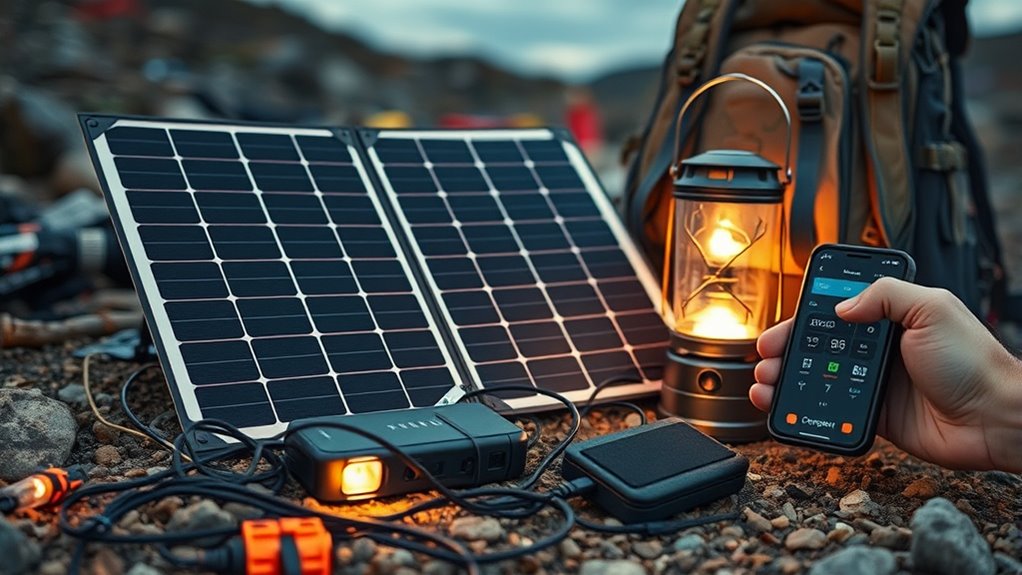
You need to think about how portable your power equipment is for easy carrying and setup. Weighing your options helps you choose gear that won’t slow you down or become a burden. Consider whether a compact unit suits your needs better than heavy-duty equipment—balance size and power carefully. Additionally, evaluating the effectiveness of energy sources can help ensure your gear provides reliable performance during your trip.
Portability Matters Most
Many assume that power equipment’s size and features matter most for camping, but neglecting weight and portability can lead to frustration. A heavy, bulky solar panel or inverter with low inverter efficiency makes setup and transport exhausting. You want reliable power without sacrificing your adventure. Imagine carrying a lightweight solar panel that easily fits in your pack, giving you energy without extra strain. Portable equipment ensures you can move freely, set up quickly, and enjoy your trip instead of battling cumbersome gear.
- Feel confident knowing your gear won’t weigh you down
- Enjoy quick setup with lightweight, portable options
- Rely on solar panels that are easy to carry and deploy
- Maximize efficiency without sacrificing convenience
Weighing Equipment Options
When choosing camping power equipment, it’s easy to focus solely on features like capacity and durability, but ignoring weight can lead to unexpected burdens. Consider how solar panels add to the overall weight of your setup, especially if you plan to carry them long distances. Also, pay attention to inverter sizing—not just for power needs but to avoid carrying an oversized unit that’s heavy and unnecessary. Lightweight options might save you effort, but make certain they still meet your energy demands. Balance is key: a heavier, more robust system might provide more power, but if it’s too heavy to transport comfortably, it defeats the purpose. Weigh your options carefully to find a solution that offers enough capacity without adding excessive weight.
Compact vs. Heavy-Duty
Deciding between compact and heavy-duty camping power equipment depends on your specific needs and priorities. If you want quick setup and easy mobility, go for compact options, especially when integrating solar panels for renewable energy. Heavy-duty gear offers robust power for longer trips or larger appliances, but requires careful inverter selection to handle high loads. Consider these factors:
- Feel confident in powering your essential devices without worry
- Enjoy seamless integration with solar panels for eco-friendly energy
- Experience reliable, consistent power for extended adventures
- Avoid surprises with inverter choices that match your equipment’s demands
Choosing the right balance ensures you’re prepared for any camping scenario, whether it’s a quick weekend or an extended stay. Focus on your power needs and how your equipment fits into your adventure’s scope.
Failing to Prepare for Unexpected Power Failures

Unexpected power failures can quickly turn a peaceful camping trip into a frustrating ordeal if you’re not prepared. To avoid this, always consider a solar backup system to maintain essential devices during blackouts. Without it, a sudden power surge or outage could leave you stranded without light or charging options. Prepare by packing extra batteries, surge protectors, and a portable power bank to handle unexpected disruptions. It’s also wise to test your backup power sources before heading out and understand their limitations. Relying solely on your primary power source leaves you vulnerable to failures. Planning for these scenarios ensures you stay comfortable, safe, and connected, even when the unexpected strikes. Failing to prepare for power failures can ruin your trip—so stay proactive.
Frequently Asked Questions
How Do I Estimate Power Needs for New or Unfamiliar Devices?
To estimate power needs for new or unfamiliar devices, start with device energy estimation by checking the manufacturer’s specifications or labels for power consumption details, usually in watts or amps. Then, perform a power consumption calculation by multiplying the device’s wattage by the hours you’ll use it daily. This helps you accurately gauge your total power requirements and guarantees your camping setup can handle your devices efficiently.
What Are the Signs of a Battery Nearing End-Of-Life During Camping?
You’ll notice a battery nearing end-of-life when you see consistent voltage drops under load and reduced runtime. Battery degradation causes it to lose capacity, making it harder to hold a charge. If your devices start shutting off sooner or the battery feels unusually warm or weak, these are signs it’s nearing the end. Regularly monitor voltage levels and performance to catch these signs early and plan for replacement.
How Does Altitude Affect Battery Performance in Outdoor Settings?
Imagine your battery as a delicate dance partner, sensitive to the mountain air. High altitude effects can cause your battery efficiency to wane, as thinner air cools the chemical reactions inside. This means your devices may drain faster or perform unpredictably. To keep your power flowing smoothly, account for altitude effects by adjusting your energy expectations and carrying extra power sources, ensuring your camping adventures stay charged and vibrant.
Can Solar Panels Fully Replace Traditional Power Sources for Camping?
Yes, solar panels can fully replace traditional power sources for camping, but you need to take into account solar panel efficiency and portable power safety. Rely on high-efficiency panels to maximize energy, especially on cloudy days. Always prioritize portable power safety by using proper connections and avoiding overloading. While solar can be reliable, having backup options ensures you won’t be left without power, making your camping experience safer and more enjoyable.
What Safety Precautions Should I Take With Portable Power Equipment?
Think you’re invincible with your portable power gear? Think again. Always prioritize fire safety by keeping equipment away from flammable materials, and never ignore electrical grounding—it’s your best friend against shocks. Use surge protectors and inspect cords regularly. Don’t forget to turn off devices when not in use. Your safety’s no joke, so treat your gear with respect, or risk turning your camping trip into a fiery disaster!
Conclusion
Now that you know where most people go wrong, you can plan your camping power setup with confidence. Don’t bite off more than you can chew or overlook the small details—after all, a chain is only as strong as its weakest link. By considering these common pitfalls, you’ll be better prepared to keep your gear running smoothly. Remember, a stitch in time saves nine, so plan ahead and enjoy your adventure worry-free.
